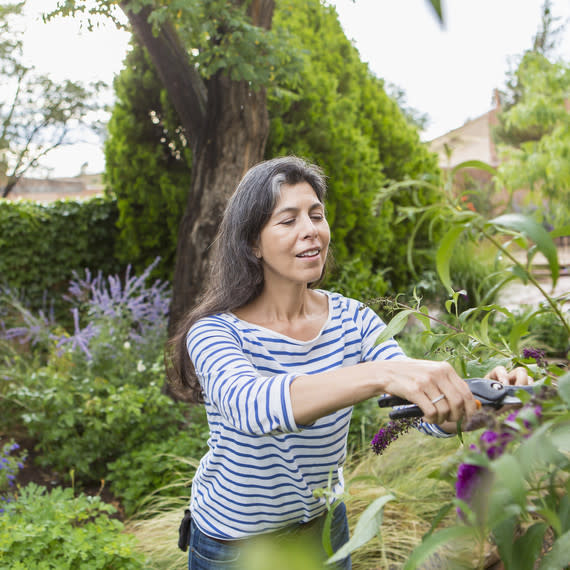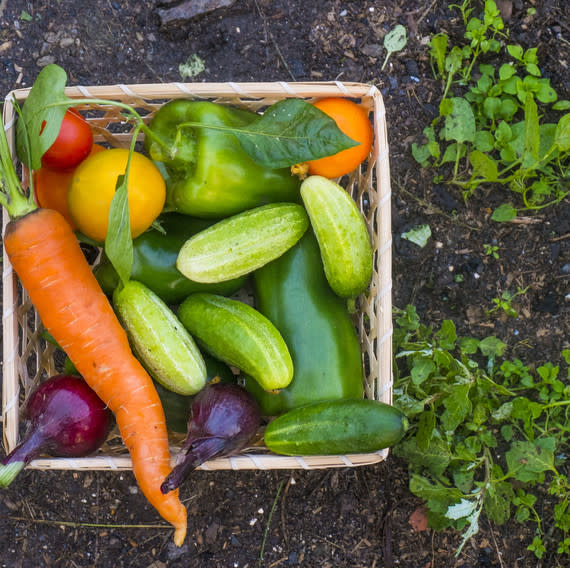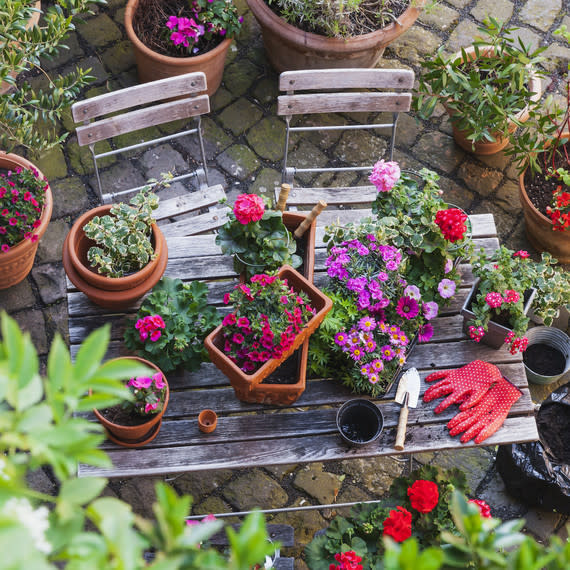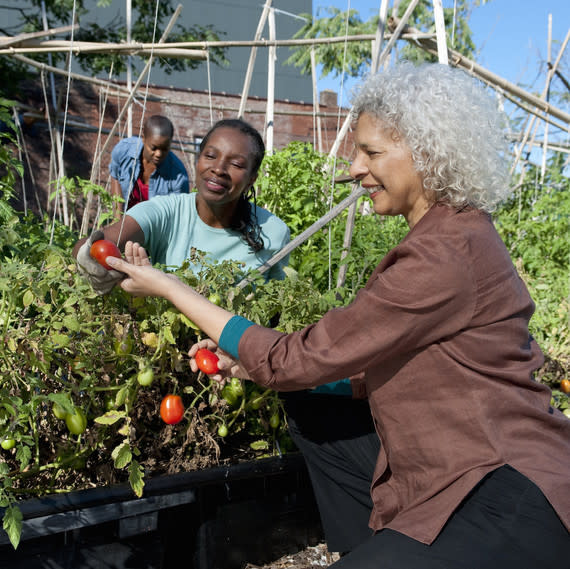Here's How Gardening Benefits Your Health

It's easy to scoff at the idea of gardening as exercise — until you've actually grabbed a trowel and dug in. More and more, scientists are confirming what avid gardeners have always known: Wrestling with stubborn weeds, trimming hedges, and spreading mulch are all good ways to work up a very respectable sweat. Working around the garden is also mentally and emotionally rewarding. We talked to horticulture and fitness experts about five big benefits of getting down and dirty in your flowerbed or vegetable patch.
It Keeps You Fit and Healthy
You don’t have to log miles on a treadmill to get some cardio in. "Gardening has all-around physical benefits in terms of cardiovascular, muscle, and bone health,” says Melissa Roti, professor and director of the exercise-science program at Westfield State University in Massachusetts. Tasks strenuous enough to leave a gardener feeling slightly winded—pushing a hand mower or raking, for example—will improve cardiovascular fitness.
Most gardening falls under the category of “moderate physical activity,” making it an effective way to shed some pounds or maintain weight, says Barbara Kreski, director of horticultural therapy services at Chicago Botanic Garden. "The more you exert yourself, the greater the benefits.”
Like traditional forms of exercise, gardening 30 minutes five days a week has been shown to lower risk for heart disease and several cancers, and helps maintain good function as the body ages, says Steven Blair, a retired professor of exercise science at the University of South Carolina and coauthor of "Active Living Every Day.”
And there’s more good news: Research also suggests that people who do heavy, weight-bearing gardening activities like raking and digging may have higher bone density than those who do not, according to Amy Wagenfeld, adjunct assistant professor at Western Michigan University department of occupational therapy and author of “Therapeutic Gardens: Design for Healing Spaces.”
[TRY: These 10 Plants to Sleep Better Tonight]

It Can Help Ease Chronic Pain
Less-strenuous forms of yard work have pluses, too, especially for gardeners with chronic pain or arthritis. Gardening can act as rehabilitative occupational therapy for those with chronic pain or injury. “Staying active, within reason, is important for people with arthritis,” Wagenfeld explains. Physical activity can relieve stiffness in joints, leading to increased range of motion, while decreasing joint swelling and the pain that comes with it.
But before you trade your prescriptions for a trowel, talk to your doctor. “For anyone recovering from an illness or who has a chronic condition, it is critically important to get approval from their healthcare practitioner to start or resume gardening,” Wagenfeld says.
Gardeners with mobility issues and chronic pain can make small adjustments to reap gardening’s benefits. “In our program at Wilmot Gardens, we work with people recovering from stroke as well as those with movement disorders,” says Elizabeth Diehl, director of therapeutic horticulture for Wilmot Gardens at the University of Florida. “Most horticulture tasks can be designed to emphasize certain physical functions, such as fine motor skills, eye-hand coordination, range of motion, and others.” You can make similar adjustments in your home garden with your doctor’s advice.
For someone with leg pain, for example, raised garden beds can be beneficial—as long as the box is raised enough for the gardener to] tuck her legs underneath. “If you think about a traditional raised-bed garden, it’s shaped like an open shoebox,” Wagenfeld says. “And in order for a person to sit, they’d have to sit sideways,” Tucking the knees under the gardening area is better ergonomic practice. Consider a bed on tall stands that has plenty of legroom.
And look out for user-friendly implements. Ergonomic gardening tools, once hard to find, are now available at most stores. Wagenfeld advises using lightweight titanium tools with larger handles, which are easier to hold.

It Clears Your Head
The benefits of gardening go beyond physical health. Studies show that almost any kind of moderate exercise reduces stress, but gardening may have an added benefit. "Working and being in green spaces provides cognitive rest that can help reduce feelings of stress, depression, and anxiety," says Roti.
Kreski agrees. “It really always seems to go back to stress,” she says. “You can logically say that being outside disrupts that ‘hamster wheel of thoughts’ that we see related to stress.”
Simply enjoying a patch of green, even from afar, can be therapeutic. When Texas A&M University researcher Roger Ulrich compared hospital records of patients recovering from gallbladder surgery, he discovered that the ones whose rooms had a view of nature recovered more quickly than those who looked out at a brick wall.
According to Kreski, this is because “looking at nature gives our brains a rest from intense cognitive function,” or the brainpower we exert on our daily tasks. “Nature is an easy thing for our senses to perceive and take in—you can look at a tree and you don’t have to figure out anything,” says Kreski. How long does it take to relax and let go of stress once someone steps outside? “Certainly less than twenty minutes,” says Kreski. “In that time, physiological markers like sweat, cortisol, heart rate and blood pressure drop to normal ranges.”
If you don’t have a green thumb, Kreski recommends starting with a plant that has high sensory appeal. “Something like an herb starter kit from the grocery store is great for beginning gardeners,” she says. “You can appreciate the smell, watch it respond to your nurturing, use it in cooking. There’s a lot of ways to appreciate it.”
And don’t take it too personally if a plant withers and dies. “Plants are meant to die,” says the expert. “Move on—don’t sweat it. If you compost that plant, you’re nurturing the next one, not losing anything.”
[FILL: Your Home With These Healing Plants]

It Helps You Meet People
Gardening can be a means of increasing social interaction, especially for isolated populations like the elderly. Diehl explains that “People who don't have a strong sense of self-worth, possibly because they don't feel like a contributing member of society due to their illness, disease, or issue, learn that they are contributing by growing plants,” Diehl says. For individuals who have limited interactions with other people, gardening can create a sense of fulfillment that staves off loneliness. “It can lead to a self-perpetuating, positive cycle, because the more you feel good about the gardening you are doing, there more motivated you are to keep doing it and trying new aspects of gardening,” she says.
It’s also a wonderful way to make and bond with new friends. Contact your local branch of the National Garden Clubs and The Garden Club of America to connect with fellow gardeners. “They have very localized clubs,” says Kreski, so you’re likely to find one that focuses in your area of interest.
And then there’s the best—and easiest—way to meet new people: Be in your garden often. “If you’re in that space between your house and the sidewalk or street, that makes you available for social contact,” Kreski says. “It’s a lot like being on a front porch.”
It Improves Your Diet
If you’re a vegetable grower, there’s the obvious advantage: You get to eat them. Gardening is a simple way to get more nutrients in your diet. “If you grow your own produce, your own herbs, and vegetables, you have more control because you have the opportunity to grow a healthy diet,” says Wagenfeld. “For people who don’t have ready access to fruits and vegetables, that’s life-altering.”
And you might turn your children into lifelong vegetable-lovers. Wagenfeld points to the growing trend of school gardening programs as examples of this. “For children whose parents are of a low socioeconomic status [who have] the opportunity to grow vegetables through a school gardening program and [get] to eat them is a way to turn their lives around early,” she says. “Kids can even be teachers to their parents."

